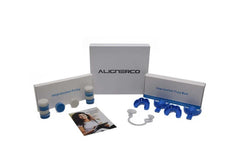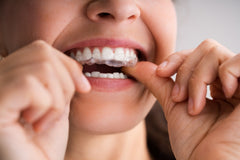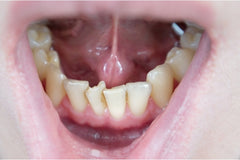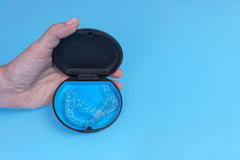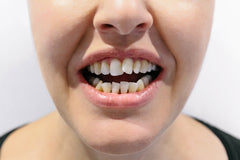Table of contents
Having a dry mouth occasionally is common and usually not a cause for concern. However, when it becomes a persistent condition, it can lead to discomfort and serious oral health issues. This comprehensive guide delves into the causes of dry mouth, its impact on oral health, and practical steps you can take to alleviate the condition.
Check Before Applying Whether You Are a Suitable Candidate:
Take an Assessment Test
Understanding Dry Mouth
What is Dry Mouth?
Dry mouth, scientifically known as xerostomia, occurs when the salivary glands in the mouth don't produce enough saliva to keep the mouth wet. As mentioned on Mayo Clinic website saliva is essential for digesting food, protecting teeth from decay, preventing infection by controlling bacteria in the mouth, and helping you chew and swallow. Without enough of it, one may face various oral health issues.
Common Causes of Dry Mouth
- Medications: Hundreds of medications, including antihistamines, decongestants, painkillers, diuretics, and antidepressants, can cause dry mouth as a side effect.
- Medical Conditions: Diseases such as diabetes, Sjögren's syndrome, HIV/AIDS, and Parkinson's disease are known to cause dry mouth. Radiation therapy to the head and neck areas and chemotherapy can also affect the salivary glands, reducing saliva output.
- Lifestyle Factors: Smoking or chewing tobacco can affect saliva production. Frequent breathing through the mouth can also dry out the oral cavity.
The Impact of Dry Mouth on Oral Health
Tooth Decay and Gum Disease
Saliva washes away food particles and neutralizes acids produced by bacteria in the mouth, helping to protect you from microbes that multiply and lead to disease. Without enough saliva, the risk of tooth decay and gum disease increases significantly.
Difficulty Eating and Speaking
Saliva makes it possible to taste, chew, and swallow food more easily. With dry mouth, these basic activities can become difficult and less enjoyable. It can also cause a sore throat, hoarseness, and bad breath.
Practical Remedies for Dry Mouth
Home Remedies
- Stay Hydrated: Drink plenty of water to help keep your mouth moist. Keeping a glass of water by your bedside or carrying a water bottle throughout the day can be beneficial.
- Stimulate Saliva Production: Chew sugar-free gum or suck on sugar-free hard candies. Look for products containing xylitol, which can also help protect your teeth against decay.
- Humidify Your Environment: Using a humidifier in your bedroom at night can add moisture to the air, helping to relieve the discomfort of dry mouth.
Over-the-Counter Solutions
- Saliva Substitutes and Oral Moisturizers: Products like saliva substitutes or oral moisturizers can provide temporary relief. Look for those that mimic the properties of natural saliva.
- Alcohol-Free Mouthwash: Mouthwashes designed for dry mouth can help relieve symptoms without causing further dryness, which alcohol-based products can induce.
Preventive Measures and Lifestyle Changes
Hydration and Diet
- Limit Caffeine and Alcohol: Both can dehydrate you and exacerbate dry mouth symptoms. Opt for water, caffeine-free tea, or diluted juices instead.
- Avoid Dry and Salty Foods: Opt for moist dishes and consider using sauces or gravies to help swallow dry foods.
Oral Hygiene Practices
- Brush and Floss Regularly: Use fluoride toothpaste and a soft toothbrush to protect your teeth. Flossing daily helps remove plaque and food particles between teeth where a toothbrush can't reach.
- Dental Visits: Regular check-ups are crucial for detecting and treating dry mouth-related problems early. Discuss the best fluoride rinses and toothpaste with your dentist to prevent tooth decay.
When to See a Professional
Persistent dry mouth should be evaluated by a healthcare provider to determine the underlying cause and appropriate treatment. If you're taking medication that you suspect is causing dry mouth, talk to your doctor about possibly adjusting the dosage or switching to an alternative.
Got Any Questions Related to Oral Care? Call Us Now At: (365) 398 5838
Conclusion
Dealing with dry mouth requires a combination of treatments and lifestyle adjustments. Understanding the underlying causes and implementing the remedies and preventive measures outlined here can greatly alleviate symptoms and improve your quality of life.
FAQs
1. Can certain foods help with dry mouth?
Yes, foods high in moisture, like fruits and vegetables, can help alleviate dry mouth. Avoid spicy or salty foods, as they can further dry out the mouth.
2. Is dry mouth a sign of dehydration?
Dry mouth can be a symptom of dehydration but can also result from other factors. If increasing water intake doesn't alleviate dry mouth, consult a healthcare professional.
3. How often should I visit the dentist if I have dry mouth?
Individuals with dry mouth should aim for dental check-ups at least twice a year, though your dentist may recommend more frequent visits depending on your condition.
4. Can dry mouth be completely cured?
Treatment and management of dry mouth depend on its cause. Some causes are easily treatable, while others may require ongoing management strategies.












